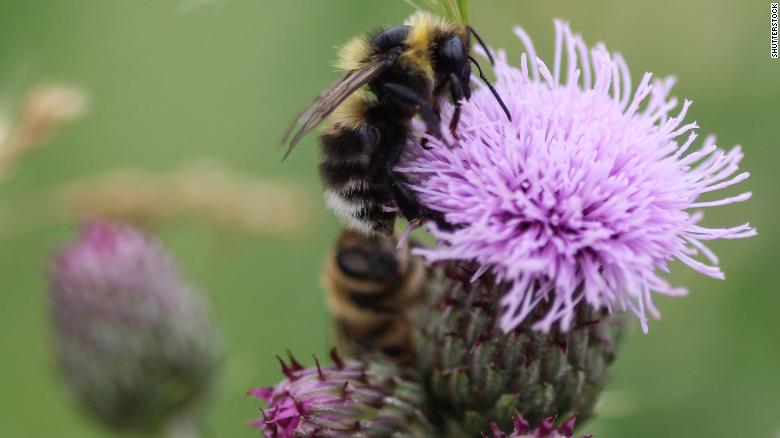- Click to share on Facebook (Opens in a new window)
- Click to share on Twitter (Opens in a new window)
- Click here to share on LinkedIn (Opens in a new window)
- Click to email a friend (Opens in a new window)
(CNN) - It's called inadvertent apocalypse: the amount of insects is rapidly decreasing and 41% of insect species are on the verge of extinction, scientists say.
"If these massive declines continue, the ramifications are huge," said Dave Goulson, a professor of biology at the University of Sussex in the United Kingdom and author of a new report on the decline of insects for UK Wildlife Trusts.
“Three quarters of our crops depend on insect pollinators. The crops will start to fail. We won't have things like strawberries, ”he told CNN.
"We cannot feed 7.5 billion people without insects."
However, the report says that we can all act as lifeguards and take relatively simple measures to help reverse what the report describes as a "catastrophic decrease in the abundance and diversity of insects."
“Insects live in our parks and gardens. Gardeners can really make a difference, ”he said.
In Sichuan, China, farmers manually pollinate apple trees. The use of strong pesticides means that farmers must do the work of bees, although manual pollination also increases productivity and allows cross-pollination.
“The biggest challenge is to make agriculture more friendly with wildlife. Pesticide reduction objectives. That would help tremendously. ”
Insect populations are declining
Collapses have been reported in insect populations in Germany and Puerto Rico. And a global scientific review published earlier this year estimated that, on average, the number of insects is decreasing by 2.5% each year, with more than 40% of endangered insect species.
In North America, the report says that five species of bumblebees have suffered a massive decline in scope and abundance in the past 25 years, and one, Franklin's bumblebee, became extinct. In Ohio, the butterfly population has declined by a third.
In Britain, where the report focuses, the overall abundance of larger moths fell 28% in the period from 1968 to 2007 and butterflies have also experienced large declines.
Goulson said there were more than 70 studies showing the decline of insects in one place or another, but there were "huge data gaps," particularly outside of Europe and North America.
MIRA : How would the extinction of insects affect the planet?
“Information about insect populations in the tropics, where most insects live, is scarce. We can only guess what impact the deforestation of the rainforests of the Amazon, Congo or Southeast Asia has had on the life of insects in those regions, ”says the report.
Birds, which often rely on insects for food and are better studied, are also in decline in many places, Goulson noted.
He said habitat loss was the big culprit in the decline in insect populations worldwide, but the use of pesticides in agriculture and climate change were also contributing.
Bee bombus sylvarum collecting nectar from a flower.
What you can do in your own garden
The report suggests a number of things that people can do to help insect populations recover. In the United Kingdom, the gardens and backyards make up 430,000 hectares of land, an area much larger than that protected by national parks, Goulson said.
Cochineal on a branch with lichen.
- Mow the lawn less frequently and allow part of it to bloom. Watch weeds like dandelions, which are excellent for bees, like wildflowers and let them grow.
- Grow plants that attract pollinators such as bees and butterflies, such as lavender, peppermint and buddleia.
- Make an insect hotel or provide a trunk or a pile of weeds. These attract humble insects like cochineal, which recycles nutrients and acts as food for birds and small mammals.
- Dig a pond and see how it attracts dragonflies and whirligig beetles.
- He urges local authorities to plant native trees that bloom in the streets and parks and plant wildflowers in medium-sized roads.
- Avoid the use of pesticides and encourage the authorities to do the same.
Insects

